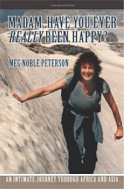Some could say that I was not an activist mother. That is, a den mother, a Girl Scout leader, or a Sunday school teacher. I was religious about attending parent-teacher conferences and open house at school, but I longed for those times when I was without a gaggle of children, especially that hour on Sunday morning when the little ones were being ‘civilized’ and I could sit quietly in a pew contemplating whatever was on the upcoming agenda, or meditating quietly, or maybe even napping unobtrusively. On occasion I would even sneak home and spend a delicious hour with my husband, our only chance to be alone all week.
I know this sounds shameful, but I felt that I deserved a reward after getting everybody bathed, combed, and dressed appropriately. Those were the days, you may remember, when you had to dress up to enter the sanctuary. No jeans, no cutoffs, no sweatshirts. It took so long to get everybody ‘presentable’ that you needed a good dose of religion just to deal with the resulting trauma. I think the present system of casual attire is far to be desired. And I don’t think God or Jesus gives a damn.
In fairness to the “olden days,” as my children called the springtime of my life, I might add that my mother, a preacher’s wife, was the first female in our Methodist Church to eschew wearing a hat to church. She felt it was an egotistical extravagance that only served to block the vision of the person sitting behind you. And this was back in the 1950’s. She also disapproved, in her own way, of the fanfare over fancy outfits at Easter, and signaled as much by buying ours at the enticing after-Easter sales. Add the fact that she never appeared in church on time, and I’d say that she was quite a rebel. But, then, she never arrived anywhere on time.
For a short period while we were living in New Providence, New Jersey, I piled the children into our VW van and drove half-an-hour to Plainfield to worship in a church where many of my friends from the Plainfield Symphony were members, and the minister’s uplifting message combined with the political activism of the congregation were important to me. Don’t forget, I was the offspring of a liberal Methodist minister.
Two years later, when we moved to Summit, I searched everywhere for a local church school that wouldn’t indoctrinate my children with old-time bible stories, or try to get them to accept Jesus Christ as their Lord and Savior in an hysterical conversion at the tender age of ten. I canvassed every church in town. After each new ecclesiastical sampling, the kids, led by Cary, would come home and regale me with tales of biblical miracles learned in the more conservative churches, and it became exhausting trying to explain the meaning of the stories from an historical or allegorical perspective, especially when the children, in their youthful wisdom, asked me why I sent them to Sunday school if I disagreed with what they were being taught. That caught me up short. So I enrolled them in the Unitarian fellowship and not long afterwards overheard Chris remark that he went to Sunday school to learn geography and to school to learn to pray (those were the days of the school prayer controversy). But he didn’t mind, he assured us, because he loved to read maps and paint. It sounded a bit upside down to him, but that was O.K., too.
I was reminded of one of his first religious experiences, which he later told me turned him off religion permanently. Pretty dire at such a young age, I thought. It was the summer of 1958 and we lived in Coral Gables, Florida, shortly after the birth of Tom. Cary was almost six and Chris was four. Martha was still in a playpen. There was a two-week summer bible school at the Episcopal Church, which would give me three blessed hours of relative peace every morning. I couldn’t see that any damage would be done in such a short time. I recalled that in my childhood, in summer church school, most of the time was spent coloring bible scenes and playing on swings. Glen, however, was adamantly opposed, but he wasn’t doing all the housework or nursing the baby, was he? I won.
I did not know, until Chris told me later, that the teacher made the little ones stand at attention for an hour at the beginning of each day to sing hymns and recite verses. And they never went outside to play. Not easy for an antsy little boy!
At dinner one day Cary announced that she had learned to genuflect that morning. Glen looked at me. “No indoctrination?” he said, raising his eyebrows accusingly.
“And how do you do that, Cary?” I asked.
“Well, there’s this man hanging on a cross in the front of the church and you come down the aisle slowly, and just as you get to your pew, you kneel down on one knee, pull out your guns, and shoot him between the eyes…like this.” Whereupon she did her best Davy Crockett imitation of gun slinging, sans gun, ending with a huge grin.
I looked at Glen. “I don’t think any serious damage was done, do you?”
My next recollection of Cary’s religious development was when she was thirteen. While ruminating over things theological, she told me she had decided that God was a figment of man’s imagination, created to help him adjust to his environment, which, most of the time, he couldn’t understand. She thought that God was created in man’s image and not the other way around. When I related this to my father his response was, “By Jove, she’s a thinker.”
This took me back to the day when I was eleven and my father approached me after church, asking what I had said to the Sunday school teacher that prompted her to resign. “She asked us what we thought of God. I just said that I didn’t know if I believed in God, because I hadn’t seen Him, whoever He was.”
My father nodded, thoughtfully. “Fine,” he said. “It shows that you’re thinking. She seems to feel that she is not up to the modern child. Remember, Margaret, you must always speak honestly and respectfully about what you believe, and keep searching for answers.” Nothing more was said, but I got the feeling that my father was pleased with me.
We did find a Congregational church that was middle-of-the-road, community-oriented with a great outreach program, and, in recent years, open and affirming (meaning it welcomed gay people). I always wondered what Jesus would think if he knew that a congregation had to vote on whether to include “those people” in its flock, but I tried not to be judgmental. I was only one voice, albeit loud.
I finally decided that my job was to see that my children had a good moral foundation and an understanding of their religious background, including the great old traditional hymns and anthems. Since I was a musician, I also wanted them to be introduced to the best classical organ and choral music available. And I would leave the choice of doctrine to each one of them as he or she grew older.
My husband was a bit disappointed by my lack of certitude, because he thought I would be the leader in this area of family life. But why was that my job? Alas, so I fell short in his eyes. Truth be told, we both had a healthy dose of agnosticism in our belief system, which, I might add, was encouraged by my father in his attempt to avoid indoctrinating his three daughters as he had been indoctrinated by his Salvation Army parents. This meant that we had a whole lot less to agonize over and jettison as we grew older.
But I could never shake an emotional feeling about the way I had experienced Sunday as a youngster. I wanted to keep that idyllic picture alive and pass it on to my children. I yearned for those close family Sundays when, fresh from an inspiring service, featuring a provocative sermon from my father and a rousing anthem from a full-throated choir, we gathered around the dining room table for Sunday dinner with an extended family, which included Grandpa and Grandma and a host of weekly guests–missionaries from far-flung exotic places, visiting clergy, or some lonely personage Mother had picked up after the service. It was interesting and it was lively. And I didn’t have to prepare those elaborate dinners, so I loved them!
This was not to be my family’s experience. I did, however, make every effort over the years to keep Sunday a special family day, with or without attendance at a particular church.
All my children have made their way, spiritually, from Christianity to Buddhism, from agnosticism to pantheism, and many places in between. I’m happy to say that the most important part of the whole adventure is their awareness of their own worth and their inherent divinity, and the responsibility that this entails, whether interpreted through nature, good works, art, literature, or music. And probably all of them will say that their most memorable religious experiences were in the mountains or by a lake or at a summer camp where they read poetry and sang, while immersed in the solitude and wonder of the natural world.

